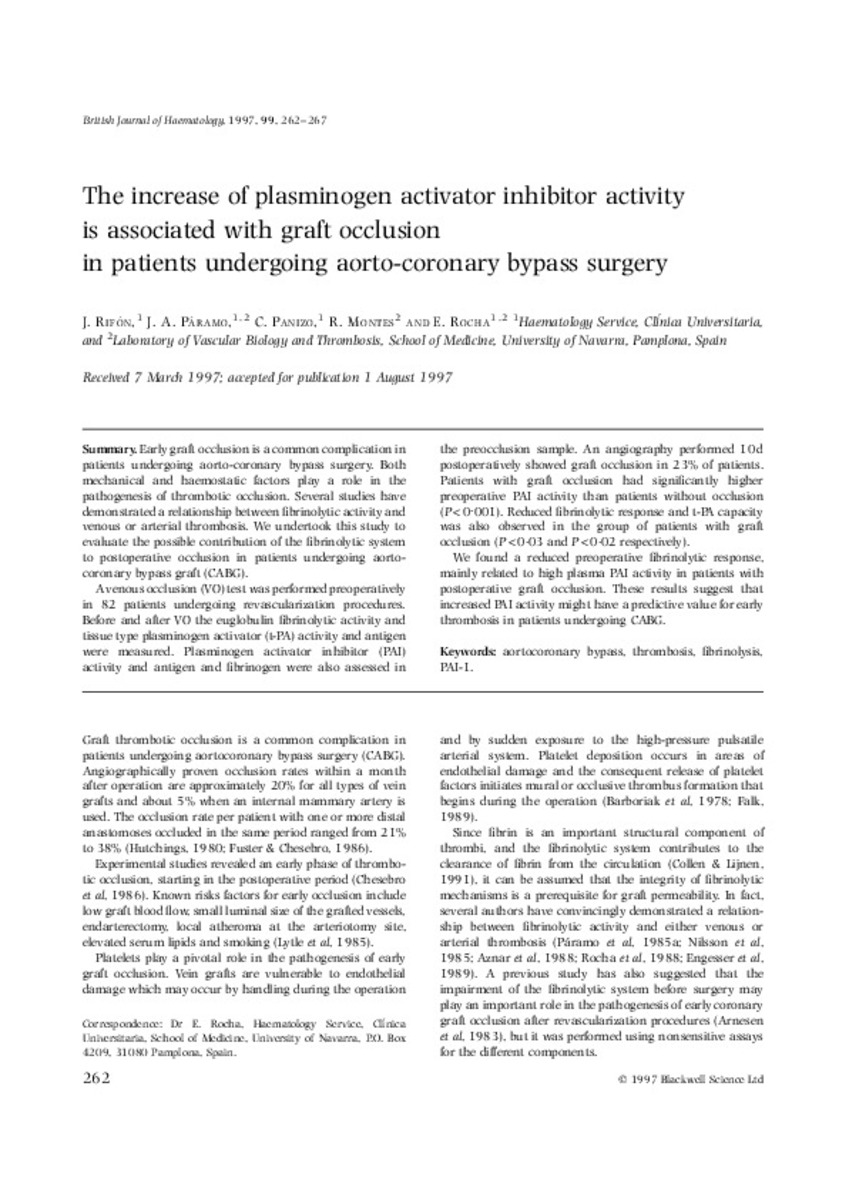Full metadata record
| DC Field | Value | Language |
|---|---|---|
| dc.creator | Rifon, J. J. (Jose J.) | - |
| dc.creator | Paramo, J.A. (José Antonio) | - |
| dc.creator | Panizo, C. (Carlos) | - |
| dc.creator | Montes, R. (Ramón) | - |
| dc.creator | Rocha, E. (Eduardo) | - |
| dc.date.accessioned | 2012-05-30T15:12:52Z | - |
| dc.date.available | 2012-05-30T15:12:52Z | - |
| dc.date.issued | 1997 | - |
| dc.identifier.citation | Rifon J, Paramo JA, Panizo C, Montes R, Rocha E. The increase of plasminogen activator inhibitor activity is associated with graft occlusion in patients undergoing aorto-coronary bypass surgery. Br J Haematol 1997 Nov;99(2):262-267. | es_ES |
| dc.identifier.issn | 1365-2141 | - |
| dc.identifier.uri | https://hdl.handle.net/10171/22333 | - |
| dc.description.abstract | Early graft occlusion is a common complication in patients undergoing aorto-coronary bypass surgery. Both mechanical and haemostatic factors play a role in the pathogenesis of thrombotic occlusion. Several studies have demonstrated a relationship between fibrinolytic activity and venous or arterial thrombosis. We undertook this study to evaluate the possible contribution of the fibrinolytic system to postoperative occlusion in patients undergoing aorto-coronary bypass graft (CABG). A venous occlusion (VO) test was performed preoperatively in 82 patients undergoing revascularization procedures. Before and after VO the euglobulin fibrinolytic activity and tissue type plasminogen activator (t-PA) activity and antigen were measured. Plasminogen activator inhibitor (PAI) activity and antigen and fibrinogen were also assessed in the preocclusion sample. An angiography performed 10d postoperatively showed graft occlusion in 23% of patients. Patients with graft occlusion had significantly higher preoperative PAI activity than patients without occlusion (P < 0.001). Reduced fibrinolytic response and t-PA capacity was also observed in the group of patients with graft occlusion (P < 0.03 and P < 0.02 respectively). We found a reduced preoperative fibrinolytic response, mainly related to high plasma PAI activity in patients with postoperative graft occlusion. These results suggest that increased PAI activity might have a predictive value for early thrombosis in patients undergoing CABG. | es_ES |
| dc.language.iso | eng | es_ES |
| dc.publisher | Blackwell Publishing | es_ES |
| dc.rights | info:eu-repo/semantics/openAccess | es_ES |
| dc.subject | Aaortocoronary bypass | es_ES |
| dc.subject | Thrombosis | es_ES |
| dc.subject | Fibrinolysis | es_ES |
| dc.subject | PAI-1 | es_ES |
| dc.title | The increase of plasminogen activator inhibitor activity is associated with graft occlusion in patients undergoing aorto-coronary bypass surgery | es_ES |
| dc.type | info:eu-repo/semantics/article | es_ES |
| dc.relation.publisherversion | http://bit.ly/JRMK5f | es_ES |
| dc.type.driver | info:eu-repo/semantics/article | es_ES |
Files in This Item:
Statistics and impact
Items in Dadun are protected by copyright, with all rights reserved, unless otherwise indicated.






